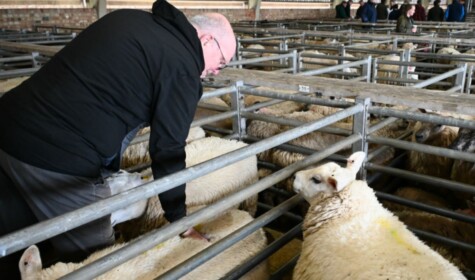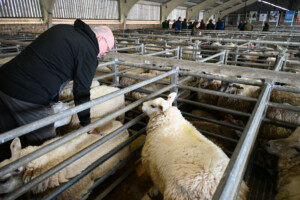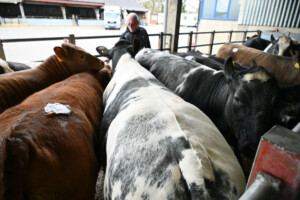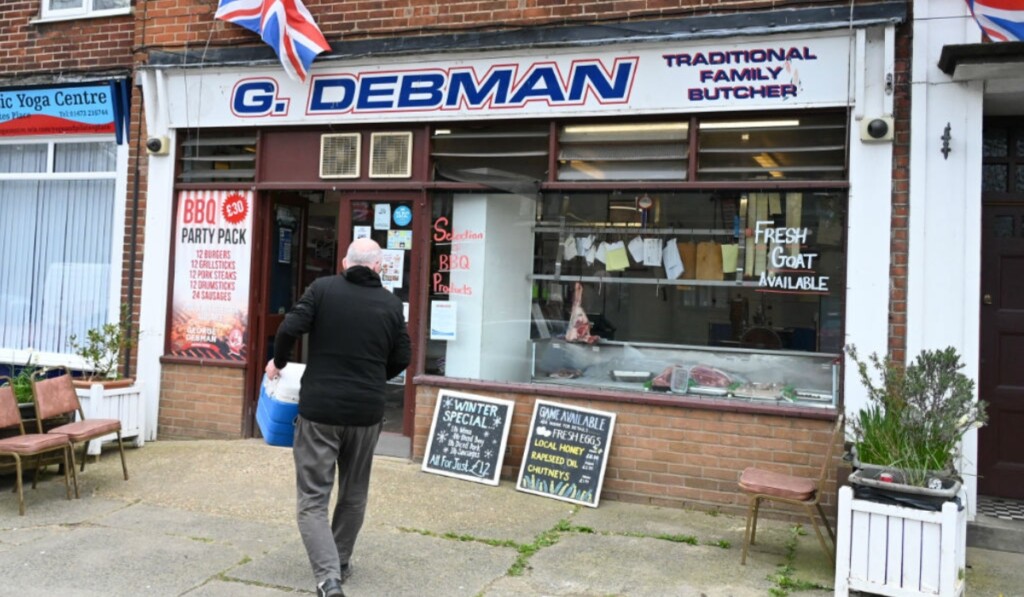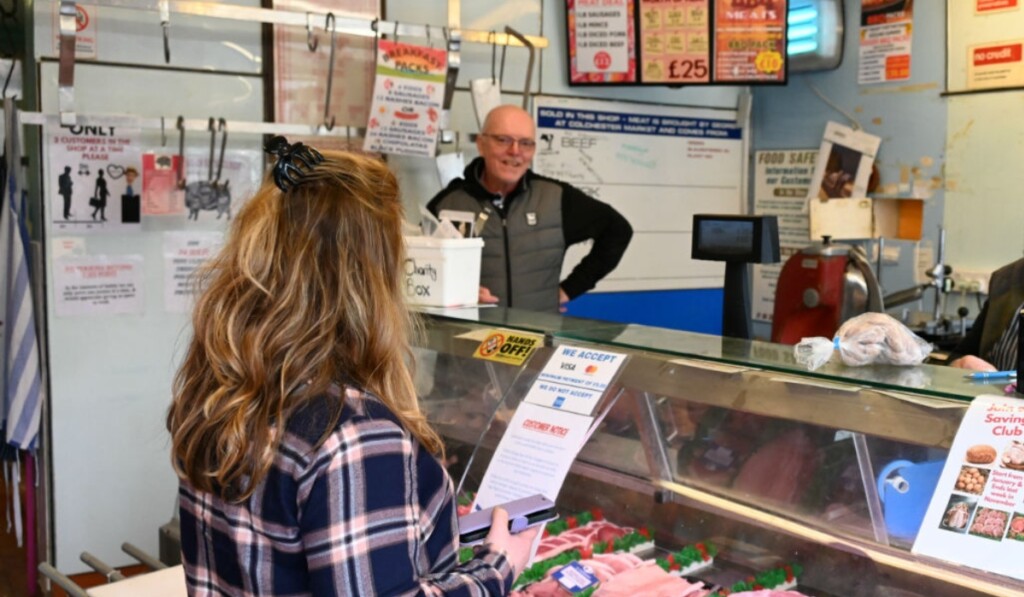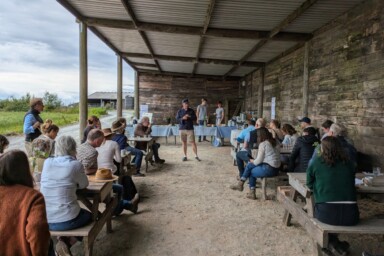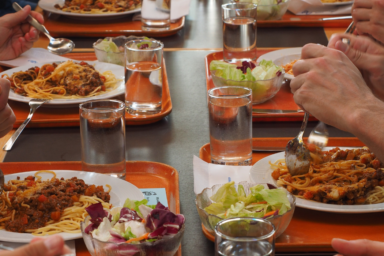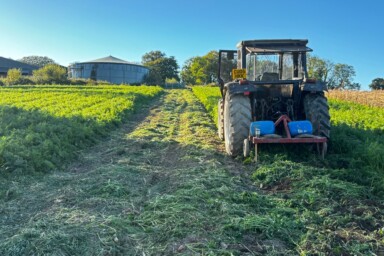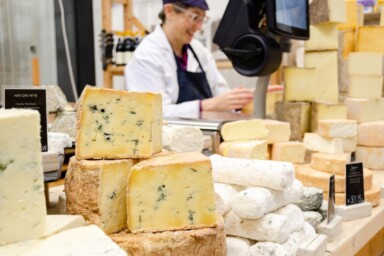In our series of butcher profiles, food and farming writer, Marianne Landzettel, meets butchers from across the UK who have built their business around high welfare, sustainably produced meat. Here, we travel to Ipswich where George Debman has followed on from his father in a traditional butchers buying local meat from local farmers.
George Debman has every intention to bid. A subtle nod, a slight raising of an eyebrow, a thumb discretely flicked up or down is all it takes at a livestock auction; visitors who don’t want to buy, better keep still. Debman owns a traditional butcher shop in Ipswich and comes to the Colchester livestock market every Tuesday to buy lambs and cattle.
When we arrive, the auction is already under way. Around 700 sheep, two to eight to a pen, are patiently waiting. Greeting farmers, fellow buyers and market staff, Debman makes his way to the back of the sales barn to inspect the lambs and decide which ones he may want to bid for. He gets into some of the pens to feel the sides of the lambs with both hands – their heavy wool coats may hide a skinny body or a thick layer of fat rather than muscle. Debman wants to buy heavy lambs. The animals will be slaughtered at a small, family run abattoir close by at a cost of £20 per head, and he wants to make sure that he isn’t just paying for a lot of skin and bones.
Debman’s father bought the shop in East Ipswich in 1963. At the end of May, the Debmans will celebrate the 60th anniversary of the business with the local community, including a bash in the pub across the road.
Debman senior began buying animals at the market when he realised that it was considerably cheaper than buying from a wholesaler. George Debman continued the tradition, not just because of the savings he can make. “I want to know where the meat I eat comes from, I want to know how the animals were raised,” he says. The farmers he buys from are local and he has known them for many years. These days, as more and more livestock markets are closing down, farmers bring their animals to Colchester from as far away as Leicestershire.
The auctioneer has moved to the lambs that Debman is interested in buying. He conducts the auction from a board that runs above the back of the rows of pens. He announces the number of animals in the lot, their weight, followed by a rapid-fire string of numbers – the bidding is under way. A few minutes later, Debman smiles as a market assistant sprays the letters G and D on the backs of four lambs. He got the ones he wanted and at an acceptable price.
Time to grab a quick cup of tea at the market café before Debman takes a closer look at the cattle. Today, there will be about 50 animals for sale. Some farmers have delivered a single bull, others want to sell several animals, both bullocks and heifers. Debman is looking for one animal only, no older than 19 months – older animals have heavier bones and therefore the bone-to-meat ratio can be quite bad. “This time of year, I am not concerned with the hind quarters, that’s where the roasting joints are and what people want in winter. In summer, we can only use it for mince. Right now, the money is in ribs and steaks,” he explains. On the back of each animal is a sticker with a number which corresponds to the listing provided by the market, it includes the age of the animal, its breed and gender.
Half an hour later, the auction starts. One by one the animals are walked across a floor scale into the small, round sales ring. The weight shows up on a digital display on the wall. Debman successfully bids for the animal he picked out in the pen, a Limousin bullock, and gets it for a good price. Before we leave he talks to James Byford, one of the owners of the abattoir where the lambs and the bullock will be slaughtered. Once the market closes, Byford will load them onto a trailer and take them to the abattoir where they will be inspected, watered and then spend the night in a pen with fresh straw bedding. “We’ve been working together for decades,” says Debman, “I know that the Byfords will take good care of the animals and they won’t be stressed, I can tell as much from the quality of the meat.” The lambs will be slaughtered the following day and delivered to the shop on Thursday. The beef quarters will mature in the chiller at the abattoir first, before being delivered to the shop.
On the way back to Ipswich, Debman points out some landmarks. On the outskirts of the city, developers have built several large shopping centres, easily accessible from the ring road. “The town centre is now almost deserted,” says Debman. There used to be a lot of factories and several flour mills, but all of them have closed down and the area is now one of the most deprived in the UK. The shopfront is decked out with Union Jacks, a bright, cheerful sight amidst the otherwise dull surroundings. Inside, special offers are listed on a blackboard. A laminated sign on the counter reminds customers that the Christmas Club is open year-round. “It’s like a savings club. From January onwards, customers pay in as much as they want and can afford and at Christmas, they will be able to get their money’s worth in turkey, ham, a big chicken or a hamper,” explains Debman’s wife Carol who helped out in the shop while her husband was at the market. Even before the cost of living crisis many people in the neighbourhood struggled financially. The Debmans therefore offer meat packs costing from £10 to £30, containing diced pork and beef, mince and sausages. There are also breakfast packs with eggs, bacon, sausages and black pudding. “We want people to be able to afford some meat. And we sell them whatever quantities they need. Some older customers will ask for one egg, one rasher of bacon and one sausage, and of course we sell that to them.”
Recently, Debman did a customer survey and found that 40% live locally while 60% travel up to 25 miles to buy at his shop. Many of his customers come from Eastern Europe: Romania, Poland and Lithuania. “They come to buy offal, hearts, lungs, kidneys, livers, pig and ox tongues, even pig stomachs, it sells out really fast.” A couple, originally from Hong Kong, comes in regularly to buy the fat end of the belly pork, sliced very thinly. “We can do that for them,” says Debman who describes himself as a very traditional butcher. Traditional butchery is also what he teaches Annie, his apprentice. If she wants to do ‘fancy’ cuts such as flat iron steaks or prepare ready meals, she’ll have to pick that skill up somewhere else, he says.
Annie Jones started helping out in the shop on Saturdays when she was still at school. She did A-levels in French, geography and politics, but she was certain that she didn’t want to go to university. “I learn best through doing,” she says. After 14 months of being an apprentice she still feels she made the right career choice and owning her own butcher shop one day would be a dream come true.
Debman, too, knew from a young age that he wanted to become a butcher. He trained at Smithfield College and finished top of his class. When his father retired aged 65, Debman took over the family business. His father passed away just a few months later. “It still makes me sad that he did not see me finish my first year of running the shop on my own,” says Debman. For the past two years he has been president of the NCB, the National Craft Butchers trade association. “My dad would be so proud of what I achieved, travelling around the country, speaking at all these events.” To him, getting more young people to come into the trade and fighting for the survival of small abattoirs are the most important tasks for the NCB. Ideally, Debman would like every craft butcher to become a member. “Collectively we are so much stronger. We have the best cattle in the world, I want us to continue working with farmers to make sure it stays that way.”
Debman is 68 now and he definitely wants to retire when he turns 70. Will he find a buyer for the business? The worst-case scenario would be for him to have to close the shop and sell off the equipment to the highest bidder. But that’s a discussion for another day. Tonight, he has just one thing on his mind: Ipswich Town is playing and he and his wife will be in the stadium, cheering their team on.
With thanks to National Craft Butchers for helping us to develop this series. To find out more, visit NationalCraftButchers.co.uk.
Photos by @M.Kunz.
